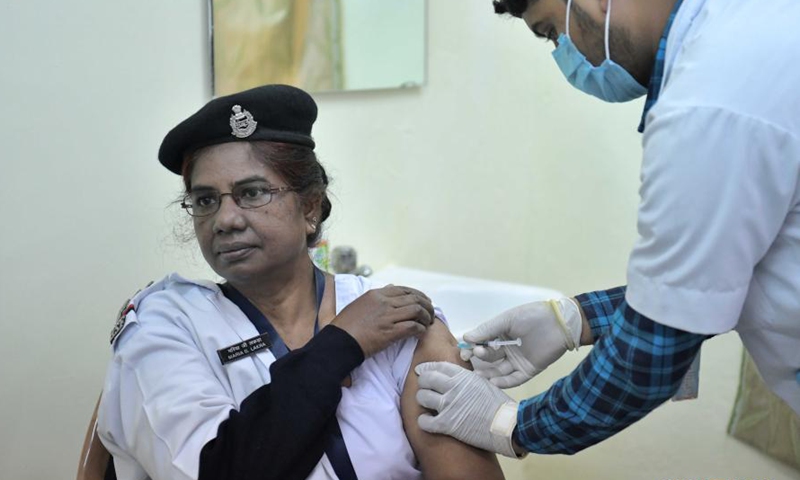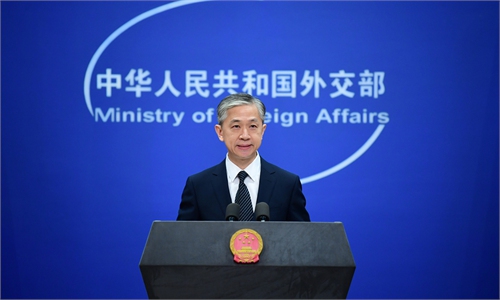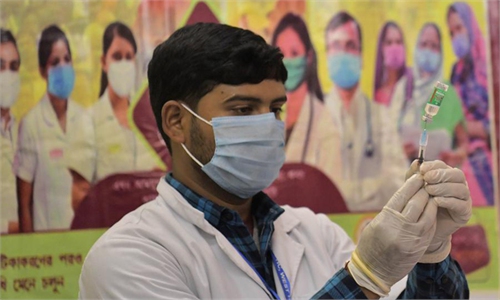India's ambitious vaccination drive could be dragged by unsustainable production, supply: analysts

A health worker of the Border Security Force receives a dose of the COVID-19 vaccine Covishield at Agartala, the capital city of India's northeastern state of Tripura, Jan. 21, 2021.Photo:Xinhua
India, which has reported the second highest number of COVID-19 cases worldwide, could take more than 10 years to finish its nationwide vaccination at the current rate, netizens said, in response to the Indian prime minister's boast that the country is the "fastest" in vaccinating its citizens.
Analysts also questioned India's capacity of sustainable production and supply to fulfill its promise to scale up vaccine supply to as many as 60 countries and regions in the coming months.
Indian Prime Minister Narendra Modi said on Sunday that the country is not only running the world's biggest COVID-19 vaccination drive, but also the "fastest" in vaccinating its citizens, The Times of India reported. "In merely 15 days, India has vaccinated more than 30 lakhs [3 million] COVID-19 warriors, while a rich country like the US has completed the same target in 18 days and the UK in 36 days," said Modi.
He boasted that "the Made in India vaccines are not only a symbol of Atmanirbhar Bharat [self-reliant India] but they are also a symbol of self-pride."
However, some netizens have done the math and found that at the current rate, it would take more than a decade for all Indians to be vaccinated.
"And by vaccinating 2 lakhs per day, we will be able to vaccinate whole country in approximate 14 years. This government compares cases per millions of population but in vaccination it is absolute numbers. What a great speed!" a netizen tweeted.
Later, another made a "correction," saying, "Sorry, 16.98 years approximately."
Another put it even longer as calculating that "vaccinating people 30 lakh in 15 days, and 1 crore [10 million] will be in 50 days," so the netizens found that to vaccinate 130 crore, or 1.3 billion Indian citizens needs 6,500 days, or 18 years.
Analysts pointed out that the netizens' calculation, although not rigorous, reflected public concern over India's capacity of vaccine production and supply.
Tao Lina, a Shanghai-based medical expert on vaccines, told the Global Times on Monday that China's current vaccination is faster than India's and is fully capable of vaccinating its citizens much faster.
Tao said the most intensive mass vaccination campaign in human history might be the nationwide measles vaccination campaign in September 2010 in China. In a 10-day period from September 11 to 20, nearly 100 million children aged 8 months to 14 years were vaccinated, or 10 million doses a day.
China reached the record of 10 million doses per day about 10 years ago, and it also can achieve this now. At such speed, the theoretical window for 70 percent of the Chinese population for inoculations is 200 days, Tao said. "China is likely to vaccinate 70 percent of its citizens to reach herd immunity within one year."
China has vaccinated key groups of people of more than 24 million doses so far since mid-December in 2020, or about one month after the vaccination work began across the country, according to a national press conference on Sunday.
Despite the long time for nationwide vaccination in India, India vowed to ramp up exports of COVID-19 vaccines.
Media reported on Sunday that as countries race to vaccinate their people against the pandemic amid global vaccine supply gaps, India is working on plans to scale up vaccine manufacture to supply as many as 60 countries and regions in the coming months.
The report noted that an additional 27 million shots of the vaccine are set to be shipped abroad on a commercial basis.
However, analysts who requested anonymity said India would face huge challenges in balancing and meeting its cumulative demand for the vaccine, as well as the risk of domestic vaccines being sold on the black market.
The analysts questioned India's sustainable production and supply. Many companies in India do not have the capacity to produce qualified vaccines, and they cannot increase capacity quickly, the analysts noted.
Global Times learned that India is still in its first phase of mass vaccination, and not everyone who wants the vaccine can get it. The vaccine is still for designated groups of people.
Srikanth Kondapalli, chairman of the Center for East Asian Studies at Jawaharlal Nehru University, told the Global Times that with over 10 million COVID-19 infections and nearly 150,000 deaths, India began the world's largest vaccination drive on January 16, and within two weeks administered the vaccine to over two million people, mainly frontline medical workers and the most vulnerable.




